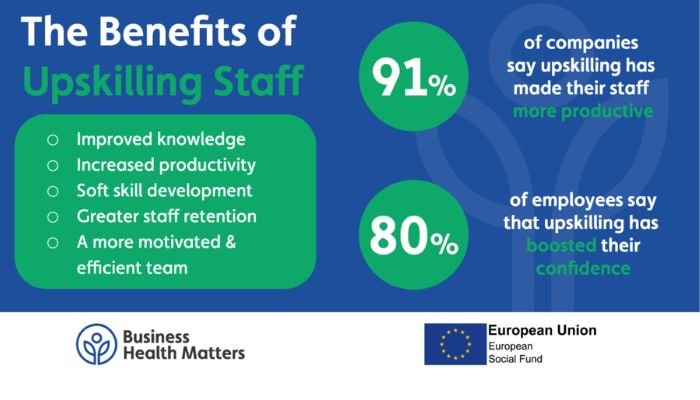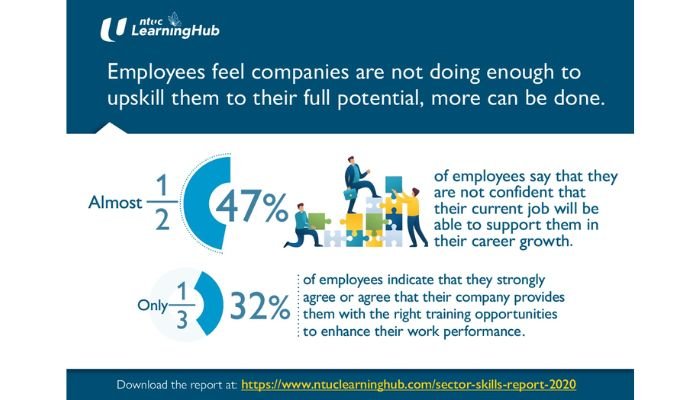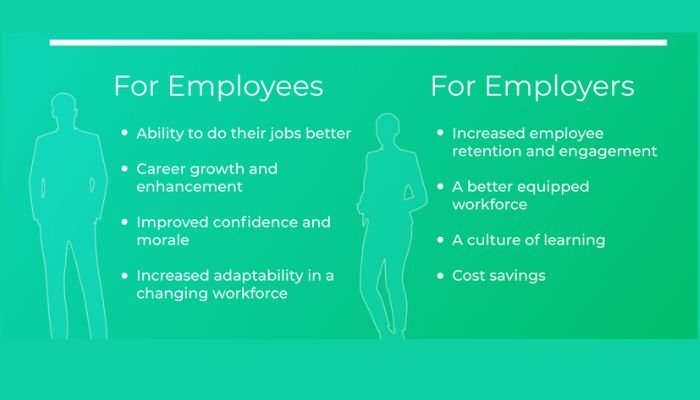Mutual Benefits of Upskilling: A Win-Win for Employees and Companies

Upskilling is a 21st century term used to describe the process of investing in and focusing on employees’ career development. Developing new skills or building upon existing abilities is seen as becoming more and more critical to remain competitive in today’s rapidly changing workplace with technology driving shift changes in job roles at unprecedented pace.
There are numerous benefits of upskilling both for employees and their employing companies alike that save time, resources and increase productivity within an organization.
In this blog we will discuss how employees can benefit from upskilling while enabling value creation for their employers leading towards a potential win-win scenario. We will also outline practical strategies that any organization can adopt when attempting to initiate upskilling programs for their workforce.
Benefits of upskilling for employees

Improved job security and employability
Upskilling is a beneficial strategy for employees to stay relevant in today’s constantly changing workplace. One of the key related benefits for employees is improved job security and employability.
With assets such as upskilled abilities, knowledge and experience in specific areas, workers offer employers greater value and stand out much more clearly compared to those who put only minimal effort into developing new capabilities. Upgrading their credentials helps create a conducive context for them when entering creative negotiations with organizations.
Increased job satisfaction and motivation
Upskilling is an important tool for gaining and maintaining competitive advantages in today’s rapidly changing economy.
For employees, taking part in upskilling initiatives provides a combination of job satisfaction, improved motivation, and greater security against outmoded skills or antiquated technologies as the working landscape continues to evolve.
Training programs offer vast opportunities to expand career paths and develop hard-to-find specializations that many employers are looking for today.
Through these educational efforts, individuals acquire invaluable capabilities which can open windows of opportunity with better economies of scale – allowing workers to stay ahead while boosting salaries.
Expanded career opportunities and upward mobility
Upskilling creates opportunities for career advancement and internal mobility, since employees can build a more competitive skillset and gain valuable experience.
By learning how to use new industry software or manage complex tasks, workers are able to show competence in their job and be considered for new positions.
With improved knowledge and skills that may even come from outside of the workplace, employees can expand their profiles within the organization or seek externally open positions with more potential for increased remuneration.
Although always a riskier path than staying employed at one company among long periods of time, taking professional initiatives shows personal growth and strong drive which comes extremely desirable to employers.
For more detail on internal mobility, please check out our Guide to Internal Mobility.
Benefits of upskilling for companies

Enhanced employee productivity and performance
Upskilling allows employees to obtain new and relevant knowledge that can be immediately applied to improve job performance.
By tapping into their strengths, employees are empowered with tools to maximize productivity and promote effective collaboration. Hard skills such as software proficiency allow employees to operate more efficiently while soft skills like communication help build relationships among colleagues.
Through upskilling, the number of workplace projects completed in a given timeframe can increase significantly, reducing overall time spent in completing them. Enhanced knowledge also widens an employee’s abilities exponentially improving individual contribution it upskilling for mutual success to the workplace as a whole.
Reduced employee turnover and recruitment costs
Upskilling presents numerous benefits for employees: improved job security and employability, increased job satisfaction and motivation, and expanded career opportunities.
One benefit especially attractive to both current and prospective employees is a reduction in employee turnover rate, freeing companies from the costs associated with searching for new recruits.
Companies that prioritize upskilling also limit the exit rate of their employees: when given proper training about new trends in their field or relative industries, workers are apt not only to better appreciate their work but see more potential with the same organization.
Increased competitiveness and adaptability in the market

Upskilling allows employees to stay ahead of the curve and maintain their competitive edge in a rapidly changing business environment.
It enables them to acquire new skills that increase their employability opportunities as well as their starting salary when going for a job change.
For instance, gaining knowledge on the artificial intelligence, data analytics, robotics etc., gives employees an advantage over non-upskilled peers even in traditional fields like accounting or human resources management.
By learning and sharpening current industry standards, skill sets needed and emerging technologies within it they are able to gain better commanding authority with potential consulting roles and be eligible contingents at separate negotiations table.
Win-win scenario: Synergy between employees and companies

Employees gain new skills and knowledge
Upskilling is a highly beneficial activity for both employees and companies. Through the development of specialized knowledge, skills and abilities associated with their current role or an entirely new one, employees are able to enjoy increased job security, greater satisfaction and larger potential for career growth.
At the same time, businesses gain from increased organizational performance through improved workforce productivity.
There’s a win-win scenario in which employees acquire new skills and knowledge that benefit their roles more effectively while at the same benefitting companies through upskilled individuals.
As a result of this synergy between employees and organizations, employed individuals proactively improve their job performance while increasing future career possibilities, creating long-term benefits for both parties involved.
Companies gain a skilled and versatile workforce
Through upskilling, both employees and companies can gain tangible benefits. Companies gain a skilled and versatile workforce capable of providing the necessary skills to meet an ever-changing business environment.
Employees are provided with further development opportunities that help them stay current in their sector or field putting themselves at an advantage to employers looking for employees who have specialist knowledge, enabling them to move upward in their chosen career path.
This mutual beneficial union stands as a win-win scenario for all involved creating lasting synergy between employees and employer quality results we all strive for.
Improved collaboration and innovation within the organization
Upskilling and improved collaboration go hand-in-hand to unlock not only the potential of employees, but also new avenues for growth within an organization.
When employees have access to better technological tools and time for professional development, it will lead to a stronger team cohesion which in turn can spark creativity and innovation.
By creating such eco-systems businesses benefit from more adaptable staffs who are experts in their areas. In short, maintaining a symbiotic relationship between upskilling initiatives for the employee’s benefit while endowing fresh skills sets in return demonstrates that everyone wins!
Strategies for successful upskilling
Identifying relevant skills and training programs
To ensure a successful upskilling program, employers should identify the needed skills for their specific industry, and then recognize approved training programs that are offered by educational institutions.
Skills development could be short-term training from attending seminars and workshops or taking supplementary courses, or long-term training such as earning industry certifications necessary to build entry-level competencies in certain fields.
Employers can leverage resources from universities and other private institutions best suited to teach current knowledge on job trends while remaining up to date with the fastest growing industries.
Establishing a supportive learning environment
Successful upskilling requires creating a supportive learning environment that motivates employees to invest time and effort into developing their skills.
Companies should provide resources such as access to mentors for guidance, virtual or onsite seminars relevant to the organization’s field of expertise and customized training programs tailored to their workers’ interests.
Flexible arrangements such as professional development monitoring, staggered work hours or telecommuting possibilities also help ensure that employees feel valued when pursuing personal growth opportunities.
Encouraging ongoing professional development
Organizations should prioritize ongoing professional development to successfully nurture upskilling in their employees.
To encourage perpetual learning, companies should consider implementing cross-departmental mentorship, offering leadership and management development opportunities, routine performance appraisals with feedbacks sessions revolving around individual and team growth possibilities; involving experts or trainers from outside the organization for specialized training etc.
Additionally, organizations should try to motivate employees by rewarding knowledge gain with titles or monetary rewards whenever possible which would help endorse lifelong learning skills among them.
Conclusion
Upskilling presents both employees and companies with invaluable opportunities to reap rewards. Employees acquire specialized knowledge and skill sets which allow them better employment prospects, career advancement, higher job satisfaction, and enhanced motivation.
Companies are able to accelerate their competitive edge of the marketplace through a skilled, productive workforce while also relatively reducing employee turnover costs associated with recruiting new talent.
To achieve optimal mutual success in this modern age of accelerated change, upskilling must be identified as crucial priority for employers as well as staff representatives within any organization.
- Mastering Internal Mobility: A Comprehensive Guide to Success - August 10, 2023
- Effective Recruiting Strategies in a Competitive Sales Labor Market - July 27, 2023
- 6 Essential Factors to Attract Top Talent - July 19, 2023
